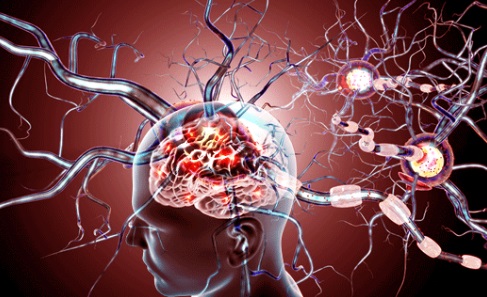Nikhil Prasad Fact checked by:Thailand Medical News Team Jan 19, 2025 1 year, 2 weeks, 2 days, 15 hours, 4 minutes ago
Medical News: A recent study delves into the intricate relationship between thyroid hormones and neurodegenerative conditions, shedding light on their potential impact on diseases like Alzheimer's and Parkinson's. This compelling research, conducted by experts from the University of Florida Jacksonville College of Medicine-USA, provides fresh insights into the physiological and pathological roles of thyroid hormones in the aging brain.
 Thyroid Hormones and Neurodegenerative Disorders in Older Adults
Understanding Thyroid Hormones in the Brain
Thyroid Hormones and Neurodegenerative Disorders in Older Adults
Understanding Thyroid Hormones in the Brain
Thyroid hormones are essential for regulating various biological processes, including brain function. Abnormal thyroid hormone levels can disrupt the central nervous system, leading to oxidative stress, inflammation, and changes in the blood-brain barrier. This
Medical News report highlights that while thyroid disorders often result in reversible neuropsychiatric symptoms, their role in chronic neurodegenerative diseases is less understood.
Evidence suggests that thyroid hormones significantly influence cognitive abilities, particularly in older adults. For instance, overt hypothyroidism - a condition characterized by insufficient thyroid hormone production - commonly causes cognitive decline, which can often be reversed with appropriate therapy.
However, hyperthyroidism, or excessive thyroid hormone levels, is associated with a heightened risk of dementia, especially in individuals over 75 years old.
Thyroid Dysfunction and Dementia
The study presents findings on how varying thyroid hormone levels impact dementia progression. Researchers observed that elevated thyroid hormone levels might accelerate cognitive deterioration. In a longitudinal analysis of elderly participants, a drop in thyroid-stimulating hormone (TSH) levels was linked to an increased risk of cognitive impairment. Moreover, untreated hyperthyroidism appeared to exacerbate this decline.
Conversely, mild hypothyroidism did not show significant cognitive effects in those above 75, suggesting a nuanced relationship between thyroid function and brain health. In fact, individuals with slightly elevated TSH levels often displayed longevity, possibly due to reduced metabolic stress.
Thyroid Hormones and Parkinson’s Disease
Thyroid hormones also play a pivotal role in Parkinson’s disease (PD), a neurodegenerative disorder characterized by motor dysfunction and cognitive decline. Studies cited in the report indicate that thyroid disorders, including hypothyroidism and hyperthyroidism, increase the risk of PD. Additionally, thyroid hormone levels directly correlate with the severity of cognitive impairment in Parkinson’s patients.
A notable mechanism involves the Rhes protein, influenced by thyroid hormones, which regulates dopamine neurotransmission. Dopamine imbalance is a hallmark of Parkinson’s. By modulating this pathway, thyroid hormones may either exacerbate or alleviate PD symptoms. Experimental t
reatments using thyroid hormone derivatives have shown promise in protecting dopamine-producing neurons, hinting at potential therapeutic applications.
Alzheimer’s Disease and β-Amyloid Processing
In Alzheimer’s disease, thyroid hormones appear to influence the processing of β-amyloid precursor proteins. Changes in the levels of these proteins are linked to the development of amyloid plaques, a hallmark of Alzheimer’s. The study highlights that thyroid hormones alter the splicing and secretion of amyloid precursor proteins, potentially impacting disease progression.
Mechanisms Underlying Neurodegeneration
-Cerebral Vasculature and the Blood-Brain Barrier
Thyroid hormones impact the blood-brain barrier (BBB), a critical structure that regulates nutrient and hormone transport into the brain. With aging, BBB function deteriorates, and thyroid hormone transport into the brain declines. This reduction may contribute to neurodegenerative changes by impairing the brain’s metabolic and protective mechanisms.
-Neuronal Viability
While thyroid hormones are vital for neuronal health, excessive levels can induce cell death. The study identifies a specific protein, the thyroid hormone-responsive protein (THRP), as a mediator of this neurotoxicity. Experiments revealed that elevated THRP expression leads to cell death in neuronal cultures, while non-neuronal cells remained unaffected. This selective vulnerability highlights the complex and context-dependent effects of thyroid hormones on brain cells.
-Cellular Stress and Oxidative Damage
Thyroid hormones can promote oxidative stress, a key factor in neurodegeneration. Increased metabolic activity due to excess thyroid hormones generates reactive oxygen species (ROS), which damage cells if not neutralized by antioxidants. Interestingly, in controlled settings, thyroid hormones have also demonstrated protective effects against transient oxidative stress, indicating their dual role in brain health.
Key Study Findings
The researchers conducted comprehensive experiments to uncover these mechanisms. Key findings include:
-Elevated thyroid hormones increase oxidative stress and cellular damage, potentially accelerating aging-related neurodegeneration.
-Specific proteins, such as THRP, mediate thyroid hormone-induced neuronal death, highlighting a potential target for therapeutic intervention.
-Thyroid hormone derivatives that do not disrupt systemic hormone levels may protect dopamine-producing neurons in Parkinson’s disease models.
-In Alzheimer’s, altered thyroid hormone levels correlate with changes in amyloid precursor protein processing, suggesting a contributory role in disease pathology.
Implications and Future Directions
The study underscores the intricate role of thyroid hormones in neurodegenerative diseases, presenting opportunities for both preventive and therapeutic strategies. Researchers advocate for further investigations into thyroid hormone analogs that could provide neuroprotection without systemic side effects. Advanced techniques like single-cell RNA sequencing may also unveil novel pathways and biomarkers for early detection and intervention.
Conclusions
This groundbreaking research emphasizes the significant influence of thyroid hormones on brain health, particularly in aging populations. While thyroid disorders are commonly associated with reversible cognitive symptoms, their contribution to chronic neurodegenerative diseases warrants deeper exploration. The findings suggest a delicate balance: thyroid hormones are essential for neuronal survival and function but can become detrimental when dysregulated. By unraveling these complex interactions, scientists hope to pave the way for innovative treatments for Alzheimer’s and Parkinson’s diseases.
Ultimately, this study reinforces the importance of thyroid health in maintaining cognitive function and preventing neurodegeneration. Clinicians and researchers are encouraged to consider thyroid hormone regulation as a critical factor in the broader context of aging and neurological disorders. For patients and caregivers, understanding these connections could foster proactive health management and improved quality of life.
The study findings were published in the peer-reviewed journal: Cells.
https://www.mdpi.com/2073-4409/14/2/140
For the latest on neurodegenerative diseases, keep on logging to Thailand
Medical News.
Read Also:
https://www.thailandmedical.news/news/viruses-and-neurodegenerative-diseases
https://www.thailandmedical.news/news/phytochemicals-from-euphorbia-peplus-enhances-autophagic-flux-and-aids-in-the-treatment-of-neurodegenerative-diseases
https://www.thailandmedical.news/news/thailand-medical-study-involving-ginger-phytochemicals-could-transform-neurodegenerative-disease-treatments
